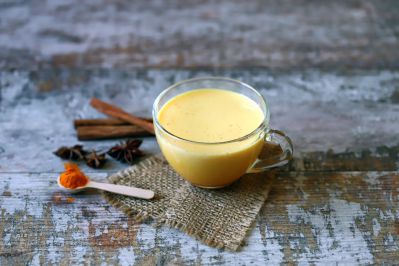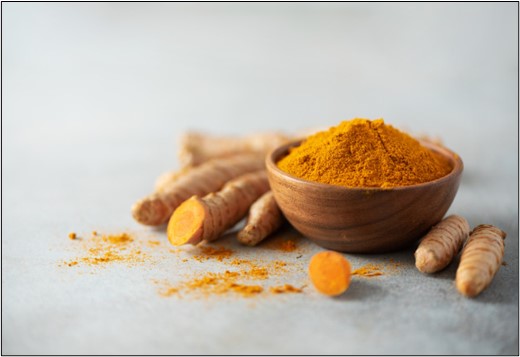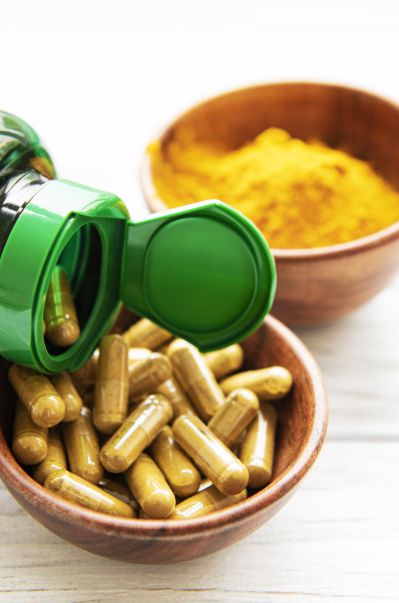Curcumin is a yellow colored chemical compound found in turmeric and has a great health importance. Chemically it is known as a polyphenolic pigment, which is produced by the plant Curcuma longa (generally known as turmeric). Recently it is used by a wide range of people as herbal supplement. Moreover, curcumin is utilized as coloring agent, flavoring agent, cosmetics ingredients and therapeutic supplements. The major functions of curcumin on human health are focused on preventing various diseases includes, cancer, arthritis and related pain, Alzheimer’s disease, depression, anxiety, and others brain diseases, furthermore it also has anti-inflammatory and antioxidant property.
Difference between curcumin and turmeric
Curcumin and turmeric are closely related and have various health importance, but they are not same. The below table shows the basic difference among them –
| Curcumin | Turmeric |
|
|
Why it should be used?
As mentioned above, curcumin is now widely used as herbal supplements and the main reasons for consuming it are listed below –
- To reduce free radicals and reactive oxygen species (ROS) within the body, which helps to reduce oxidative stress
- To inhibit the susceptibility of developing cancers
- To prevent inflammation within the body leading to reduce pain
- To promote the growth and development of brain and to prevent various disorders related with brain
- To inhibit the growth of microorganism especially bacteria and fungus within body and reduces the prevalence of infectious diseases
- Consuming supplement containing turmeric extract with curcumin is beneficial to reduce the growth of tumors, apart from that it is beneficial to maintain normal blood sugar level and blood cholesterol level
Source
Curcumin is the main substance of turmeric. The root of Curcuma longa is known as turmeric from which the name of the curcumin is derived.
Health benefits of curcumin

Antioxidant property of curcumin
- Curcumin acts as antioxidant and helps to reduce the oxidative damage of the body caused by free radicals
- Generally free radicals are substances with unpaired electrons and it is associated with reacting with other organic compounds of body like lipid, carbohydrates, proteins and DNA, and damage them
- The antioxidant property of curcumin is responsible for scavenging the free radicals and makes them unavailable for body, hence reduces the damages of organic substances
- It helps to regulate the balance of ROS in the body hence maintains the proper physiological status, which is one of the most essential features for achieving a good health
- It has shown that consumption of curcumin is coupled with activating the antioxidant enzymes of the body leading to reduce all oxidative damages

Anti-inflammatory property of curcumin
- Inflammation is a biological protective response of the body against harmful substances like, pathogens or irritant and inflammation is related with supporting the body to fight against infections
- Chronic inflammation causes various damages of body which include metabolic disorders, cancers, Alzheimer’s disease, heart disease and others degenerative diseases that affect the body adversely. Anti-inflammatory factor can help to reduce the severity of chronic inflammation and protects the body from its harmful effects
- Curcumin has anti-inflammatory activity and helps to prevent inflammation without any side effects
Role on nervous system
- Neurotrophic factors are important molecules, made up of proteins and associated with supporting the growth, development and survival of neurons which helps in the proper functioning of nervous system
- Curcumin is related with increasing the level of neurotrophic factors and promotes brain functioning
- It helps to improve memory
- It is able to reduce the complications of age related brain function

Role on heart
- Curcumin helps to prevent heart diseases by improving the endothelial function.
- Endothelium is the lining of the blood vessels, improper growth and abnormalities in endothelium interferers with blood clotting, irregular blood pressure that affect the blood circulation
- Improper blood flow in the cardiac muscle (myocardium) causes insufficient supply of oxygen and nutrients in it. Deficiency of nutrients and oxygen are responsible for the death of cardiac cells, which in later damages the heart muscle leading to myocardial infraction
- Consumption of curcumin can inhibit this complication by stimulating normal blood supply throughout the body
Role on preventing arthritis
- Arthritis is an ill condition of body which is described by inflammation in joints. As curcumin has anti-inflammatory property hence it can be able to prevent the joint inflammation which helps to inhibit the prevalence of arthritis
- It helps to reduce pain and it can be used as supplementary products to treat arthritis without any side effects
Role on preventing cancer
- Recent studies have exposed that curcumin can hinder the growth of malignant cells (Hamzehzadeh, 2018)
- Cancer is now a common life-threatening health disorder that is responsible for increasing the mortality rate worldwide. Though several treatments had developed to fight against cancer but still curcumin supplementation is used as one of the remedial measures for cancer
- It has shown that curcumin is responsible for destroying cancerous cell, inhibiting metastasis (spreading of cancer) and causes marked reduction in angiogenesis (synthesis of new blood vessels within tumor). These functions of curcumin are solely responsible for fighting against cancer

Role on mental health
- Various epidemiological studies have shown that curcumin has positive effect on inhibiting anxiety, depression and improves mental health status (Noguchi-Shinohara, 2019)
- It helps to enhance proper functioning of brain and helps to inhibit various neurodegenerative disorders.
- Among all neurodegenerative diseases Alzheimer’s disease is very common and a vital disease and it can be controlled by consuming curcumin daily
Application of curcumin
Curcumin is now utilized in several sectors for its significant importance. Some of the applications of curcumin are discussed below –
Therapeutic application
It is used as herbal supplement as it has various therapeutic advantages. Its anti-inflammatory action, antioxidant properties are related with preventing susceptibility of developing chronic diseases.
It helps to promote the nutritional status of an individual and helps to achieve a disease-free health.

Application in cosmetics sector
The anti-ageing property of curcumin is responsible for its application in cosmetics sector. It is used as an integral component of skin care preparation.
Medicinal application
It is used to treat several diseases such as, heart disease, cancer, Alzheimer’s disease, diabetes, and it also helps to reduce blood cholesterol level.
Application in food industry
It is used as coloring agent and flavoring agent by several industry and apart from that it is widely used as a spice in cooking
Side effects of using too much curcumin
Recently, curcumin is used by a wide range of population, but it should be consumed in desirable amount. According to world health Organization (WHO) the recommended dose of consuming curcumin is 1.4mg per pound of ideal body weight. Consuming curcumin more than recommendation can cause some gastrointestinal discomforts like nausea, vomiting, complication in digestion, diarrhea and it often causes headache.

Source:
Boroumand, N., Samarghandian, S. and Hashemy, S.I., 2018. Immunomodulatory, anti-inflammatory, and antioxidant effects of curcumin. J Herbmed Pharmacol, 7(4).
Daily, J.W., Yang, M. and Park, S., 2016. Efficacy of turmeric extracts and curcumin for alleviating the symptoms of joint arthritis: a systematic review and meta-analysis of randomized clinical trials. Journal of medicinal food, 19(8), pp.717-729.
Gopinath, H. and Karthikeyan, K., 2018. Turmeric: A condiment, cosmetic and cure. Indian Journal of Dermatology, Venereology, and Leprology, 84(1), p.16.
Hamzehzadeh, L., Atkin, S.L., Majeed, M., Butler, A.E. and Sahebkar, A., 2018. The versatile role of curcumin in cancer prevention and treatment: A focus on PI3K/AKT pathway. Journal of cellular physiology, 233(10), pp.6530-6537.
Hewlings, S.J. and Kalman, D.S., 2017. Curcumin: a review of its’ effects on human health. Foods, 6(10), p.92.
Javeri, I. and Chand, N., 2016. Curcumin. In Nutraceuticals (pp. 435-445). Academic Press.
Jovičić, D., Jozinović, A., Grčević, M., Spaseska Aleksovska, E. and Šubarić, D., 2017. Nutritional and health benefits of curcumin. Hrana u zdravlju i bolesti: znanstveno-stručni časopis za nutricionizam i dijetetiku, 6(1), pp.22-27.
Noguchi-Shinohara, M., Hamaguchi, T. and Yamada, M., 2019. The Potential Role of Curcumin in Treatment and Prevention for Neurological Disorders. In Curcumin for Neurological and Psychiatric Disorders (pp. 85-103). Academic Press.
Rafi, M.M., 2016. Natural curcumin of turmeric origin-the untold story. Natural Products Insider [White Paper], pp.1-11.
Vaughn, A.R., Branum, A. and Sivamani, R.K., 2016. Effects of turmeric (Curcuma longa) on skin health: a systematic review of the clinical evidence. Phytotherapy Research, 30(8), pp.1243-1264.
Yadav, R.P. and Tarun, G., 2017. Versatility of turmeric: A review the golden spice of life. Journal of Pharmacognosy and Phytochemistry, 6(1), pp.41-46.


